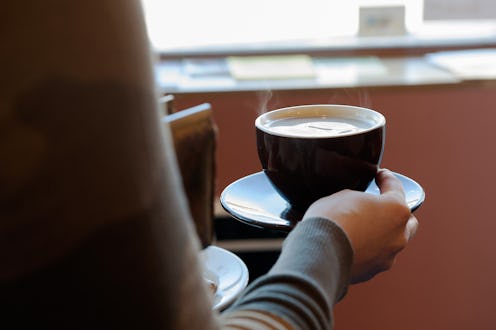
Sleep — the thing I want most that always feels just out of reach. Same? What if instead of trying to follow a perfect sleep hygiene routine at night, you also tried to get better sleep starting right when you wake up. Yes — better sleep can start even before breakfast.
Between working harder while getting paid less than any previous generation, screen time, and the stresses of every day life, millennials are feeling the strain from lack of sleep the most. A study published by the American Psychological Association reported that millennials are the most stressed-out generation, and stress is a direct path to sleeplessness. In fact, the National Sleep Foundation said on its website that "Stress causes hyperarousal, which can upset the balance between sleep and wakefulness."
Tech-reliant millennials are so exhausted that they're actually texting in their sleep, which is a warning sign that generation tired needs to address its sleep issues in order to avoid sleepwalking through life. Restonic reported that the U.S. Bureau of Labor Statistics found that although millennials spend more time in bed than other generations, they're not getting restful sleep. While it might feel like the odds of your getting the recommended seven-to-nine hours of recommended sack time are slim, if you're tired AF of being tired, there are a few things you can do at the beginning of your day to make sleep more likely at night.
1Get Outdoors In The Morning
If you like to get in some physical activity throughout the day, whether you exercise in the morning or at night might have to do with your schedule. However, doing something as simple as going for a walk in the morning could help you feel better at night, according to Dr. Frank Lipman. In his book How To Be Well, Dr. Lipman writes that going for a brief walk as soon as you wake up can help, and adjusting your exposure to light and dark is the best way to create better sleep patterns. This means that when it's light outside, you should get outside. Whether it's walking your dog, walking to get coffee, or just a quick spin around the block, a morning walk can affect how you sleep at night.
2Cool It On The Coffee
OK, full disclosure: It's 1 p.m. and I am still drinking coffee because I am so tired from not sleeping. I know full well that this creates a vicious cycle, but I do it anyway. I usually try to pump the caffeine breaks by noon, which Dr. Brandon Peters wrote for VeryWellHealth is the ideal time to stop for people who are caffeine sensitive. Otherwise, don't have caffeine at least six hours before bed in order to avoid sabotaging your sleep.
3Get Up At The Same Time Every Day
If you have a hard time falling a sleep on the regular, getting into a steady sleep-wake pattern can help, according to the National Sleep Foundation. Unfortunately this means going to bed and waking up at the same time every day, even on weekends. I know that sounds like a major drag, and there are definitely going to be times when you can't stick to the schedule. However, if sleep is like that crush who never texts you back, it's definitely worth a try to get sleep's attention.
4Don't Hit The Snooze Button
If you think whomever invented the snooze button deserves a medal and a cookie, think again. Because the snooze button only gives you an extra 10 minutes of sleep, it puts you into another sleep cycle without letting you finish it, according to the Better Sleep Council. This can throw off your entire sleep pattern. If you need some help, put your alarm clock or phone across the room where you'll be less likely to hit snooze since you're already upright and walking.
5Work Out In the Morning
If in addition to your short morning walk you also have a regular fitness routine, moving it to the morning can help you sleep better at night, according to Science Nordic. It works because morning exercise tells your body to produce melatonin earlier in the evening, which in turn helps you sleep better.
Basically, if you want to sleep as well as old-timey people did. the best way to do that is to sync your sleep cycle to the rhythm of nature. Obviously, you're not going to go to bed at 3:45 in the winter when the sun goes down (though you might be tired enough to want to). However, trying a few of these morning hacks could help you sleep better at night.